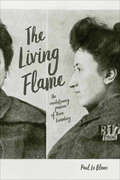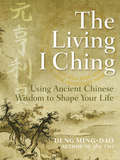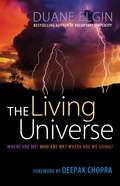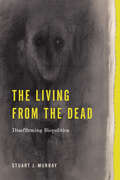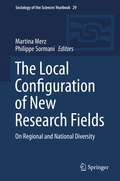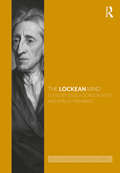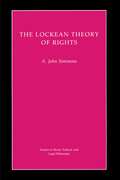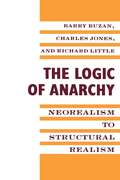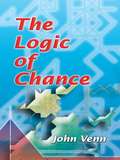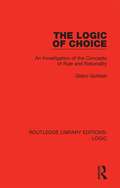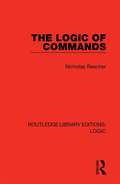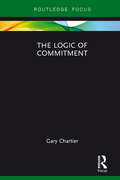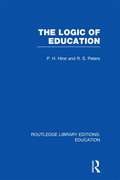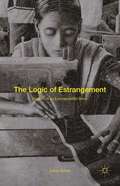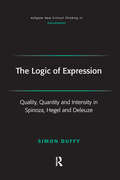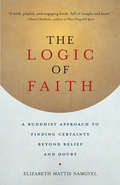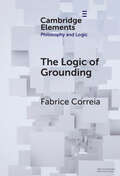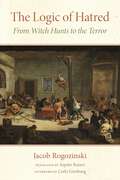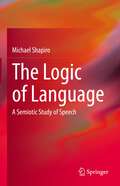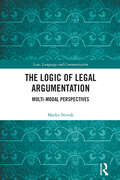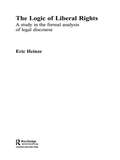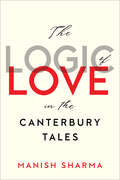- Table View
- List View
The Living Flame: The Revolutionary Passion of Rosa Luxemburg
by Paul Le BlancA collection of essays illuminating the historic Polish philosopher, economist, and activist&’s tremendous contributions to revolutionary struggle. Rosa Luxemburg, brilliant early twentieth century German revolutionary, comes alive in a rich set of essays on her life, ideas, and lasting influence. The essays deal not only with her remarkable contributions to political, social and economic theory, but also touch on her vibrant personality and intimate friendships. This collection, the fruit of more than four decades of involvement with Luxemburg's work, simultaneously showcases her penetratingly intellectual, political and deeply humanistic qualities.&“An indispensable contribution to our understanding of Rosa Luxemburg, who emerges as formidable theorist, principled activist, and above all, a fully realized human being . . . . The Living Flame affirms Luxemburg&’s lasting contribution and underscores the relevance of her legacy for our own, very different, age.&” —Helen Scott, author, The Storm of History: Shakespeare&’s Tempest and Capitalism &“A profound and multidimensional investigation of a giant thinker and revolutionary. These [essays] show meticulous historical and theoretical attentiveness and at the same time are hugely timely; a significant contribution to Rosa Luxemburg studies and Marxist theory and history.&” —Dana Mills, author, Rosa Luxemburg: Critical Lives &“Uncommonly nuanced, probing, and also deeply principled explorations. [Le Blanc&’s] mode of engagement nicely compliments that of Rosa Luxemburg and shows us her thoughts as a living and breathing work in progress, not merely echoes from an increasingly distant past. In addition, Le Blanc models how Marxists and Leftists in general might want to relate to one another when we debate complex issues and at times disagree.&” —Axel Fair-Schulz, associate professor at SUNY Potsdam
The Living I Ching
by Deng Ming-DaoFrom the author of 365 Tao and a leading authority on Taoist practice and philosophy comes a completely innovative translation of the classic text of Eastern wisdom, the I Ching. The I Ching, or Book of Changes, is an ancient manual for divining the future. Its basic text is traditionally attributed to the Chinese King Wen, the Duke of Zhou, and the philosopher Confucius. By tossing coins, rolling dice, using a computer, or, more traditionally, counting yarrow stalks, one can create a seemingly random combination of heads or tails, odd or even, yin or yang, to construct six lines (for example, solid for odd numbers or broken for even numbers). These six lines make up a hexagram that provides advice, predictions, and answers to questions on topics from love and career to family and finance. While known mostly as a tool of divination, the I Ching is also a repository of centuries of wisdom. Most of the existing translations offer either dense, scholarly commentary or little more than fortune-cookie platitudes, but in The Living I Ching Deng Ming-Dao takes a more holistic approach. His new translation recovers the true wisdom and philosophy of this ancient classic, so that the I Ching becomes more than just a book of fortune-telling -- it becomes a manual for living.
The Living Universe: Where Are We? Who Are We? Where Are We Going?
by Duane ElginBy the bestselling author of Voluntary Simplicity (over 150,000 sold)• Brings together cutting-edge science and ancient spiritual wisdom to demonstrate that the universe is a living, sentient system and that we are an integral part of it• Explores the power of this new paradigm to move humanity toward a sustainable and promising futureScience has traditionally regarded the universe as mostly made up mostly of inert matter and empty space. At one time this point of view was liberating, part of the Enlightenment-born rationalism that helped humanity free itself from superstition and fear and achieve extraordinary intellectual and technological breakthroughs. But this paradigm has outlived its usefulness. It has led to rampant materialism and environmental degradation—if the universe is essentially dead and we are alive, then the inanimate stuff of the universe should be ours to exploit. But we now know that not only is the view of a dead universe destructive, it is also inaccurate and misleading.In The Living Universe, Duane Elgin brings together evidence from cosmology, biology, physics, and even his participation in NASA-sponsored psychic experiments to show that the universe is permeated by a living field and that we are always in communion with that field of aliveness whether we are conscious of it or not. This is a world-view that, as Elgin explains, is shared by virtually every spiritual tradition, and the implications of it are vast and deep. In a living system, each part is integral to the whole, so each of us is intimately connected to the entire universe. Elgin eloquently demonstrates how our identity manifests itself on a whole series of levels, from subatomic to galactic. We are, he writes, “far more than biological beings—we are beings of cosmic connection and participation.”To confront our ongoing planetary crisis of dwindling resources and escalating conflict, we need to move past an ideology of separation, competition, and exploitation. Duane Elgin asks us to see humanity sharing in the same field of aliveness, to discover how to live sustainably and harmoniously within the living universe.
The Living from the Dead: Disaffirming Biopolitics (RSA Series in Transdisciplinary Rhetoric)
by Stuart J. MurrayIn a society that aims above all to safeguard life, how might we reckon with ethical responsibility when we are complicit in sacrificial economies that produce and tolerate death as a necessity of life?Arguing that biopower can be fully exposed only through an analysis of those whom society has “let die,” Stuart J. Murray employs a series of transdisciplinary case studies to uncover the structural and rhetorical conditions through which biopower works. These case studies include the concept of “sacrifice” in the “war” against COVID-19, where emergent cultures of pandemic “resistance” are explored alongside suicide bombings and military suicides; the California mass hunger strikes of 2013; legal cases involving “preventable” and “untimely” childhood deaths, exposing the irreconcilable claims of anti-vaxxers and Indigenous peoples; and the videorecording of the death of a disabled Black man. Murray demonstrates that active resistance to biopower inevitably reproduces tropes of “making live” and “letting die.” His counter to this fact is a critical stance of disaffirmation, one in which death disrupts the politics of life itself.A philosophically nuanced critique of biopower, The Living from the Dead is a meditation on life, death, power, language, and control in the twenty-first century. It will appeal to students and scholars of rhetoric, philosophy, and critical theory.
The Local Configuration of New Research Fields
by Martina Merz Philippe SormaniThis new Yearbook addresses the question of how policy, place, and organization are made to matter for a new research field to emerge. Bringing together leading historians, sociologists, and organizational researchers on science and technology, the volume answers this question by offering in-depth case studies and comparative perspectives on multiple research fields in their nascent stage, including molecular biology and materials science, nanotechnology, and synthetic biology. The Yearbook brings to bear the lessons of constructivist ethnography and the "practice turn" in Science and Technology Studies (STS) more broadly on the qualitative, comparative, and critical inquiry of new research fields. In doing so, it offers unprecedented insights into the complex interplay of national research policies, regional clusters, particular research institutions, and novel research practices in and for any emerging field of (techno-)science. It systematically investigates national and regional differences, including the variable mobilization of such differences, and probes them for organizational topicality and policy relevance.
The Lockean Mind (Routledge Philosophical Minds)
by Jessica Gordon-Roth Shelley WeinbergJohn Locke (1632–1704) is considered one of the most important philosophers of the modern era and the first of what are often called ‘the Great British Empiricists.’ His major work, An Essay Concerning Human Understanding, was the single most widely read academic text in Britain for fifty years after its publication and set new limits to the scope and certainty of what we can claim to know about ourselves and the natural world. The Declaration of Independence and the United States Constitution were both highly influenced by Locke’s libertarian philosophical ideas, and Locke continues to have an impact on political thought, both conservative and liberal. It is less commonly known that Locke was a practicing physician, an influential interpreter of the Bible, and a policy maker in the English Carolina colonies. The Lockean Mind provides a comprehensive survey of Locke’s work, not only placing it in its historical context but also exploring its contemporary significance. Comprising almost sixty chapters by a superb team of international contributors, the volume is divided into twelve parts covering the full range of Locke’s thought: Historical Background Locke’s Interlocutors Locke’s Epistemology Locke’s Philosophy of Mind Locke on Philosophy of Language and Logic Locke’s Metaphysics Locke’s Natural Philosophy Locke’s Moral Philosophy Locke on Education Locke’s Political Philosophy Locke’s Social Philosophy Locke on Religion Essential reading for students and researchers in philosophy, Locke’s work is central to epistemology; metaphysics; philosophy of mind; philosophy of language; natural philosophy; ethical, legal-political, and social philosophy; as well as philosophy of education and philosophy of religion. This volume will also be a valuable resource to those in related humanities and social sciences disciplines with an interest in John Locke.
The Lockean Theory of Rights (Studies in Moral, Political, and Legal Philosophy #2)
by A. John SimmonsJohn Locke's political theory has been the subject of many detailed treatments by philosophers and political scientists. But The Lockean Theory of Rights is the first systematic, full-length study of Locke's theory of rights and of its potential for making genuine contributions to contemporary debates about rights and their place in political philosophy. Given that the rights of persons are the central moral concept at work in Locke's and Lockean political philosophy, such a study is long overdue.
The Logic Of Anarchy: Neorealism To Structural Realism (New Directions In World Politics Ser.)
by Barry Buzan Charles Jones Richard LittleThis book began to take life in 1986, when Barry Buzan proposed to the others a collective volume that would try to extend the existing framework of Neorealist theory. Before that it had simply been a set of attractions, dissatisfactions, and questions in Buzan’s mind arising from his encounter with Waltz’s work while preparing the 1983 book People, States and Fear. After that it became a genuinely joint project, with an agreed division of labor, and extensive comment and cross fertilization between the drafts.
The Logic Of Infinity
by Barnaby SheppardFew mathematical results capture the imagination like Georg Cantor's groundbreaking work on infinity in the late nineteenth century. This opened the door to an intricate axiomatic theory of sets which was born in the decades that followed. Written for the motivated novice, this book provides an overview of key ideas in set theory, bridging the gap between technical accounts of mathematical foundations and popular accounts of logic. Readers will learn of the formal construction of the classical number systems, from the natural numbers to the real numbers and beyond, and see how set theory has evolved to analyse such deep questions as the status of the continuum hypothesis and the axiom of choice. Remarks and digressions introduce the reader to some of the philosophical aspects of the subject and to adjacent mathematical topics. The rich, annotated bibliography encourages the dedicated reader to delve into what is now a vast literature.
The Logic in Philosophy of Science
by Hans HalvorsonMajor figures of twentieth-century philosophy were enthralled by the revolution in formal logic, and many of their arguments are based on novel mathematical discoveries. Hilary Putnam claimed that the Löwenheim-Skølem theorem refutes the existence of an objective, observer-independent world; Bas van Fraassen claimed that arguments against empiricism in philosophy of science are ineffective against a semantic approach to scientific theories; W. V. O. Quine claimed that the distinction between analytic and synthetic truths is trivialized by the fact that any theory can be reduced to one in which all truths are analytic. This book dissects these and other arguments through in-depth investigation of the mathematical facts undergirding them. It presents a systematic, mathematically rigorous account of the key notions arising from such debates, including theory, equivalence, translation, reduction, and model. The result is a far-reaching reconceptualization of the role of formal methods in answering philosophical questions.
The Logic of Chance: An Essay On The Foundations And Province Of The Theory Of Probability, With Especial Reference To Its Logical Bearings And Its Ap (Dover Books on Mathematics)
by John VennNo mathematical background is necessary to appreciate this classic of probability theory, which remains unsurpassed in its clarity, readability, and sheer charm. Its author, British logician John Venn (1834-1923), popularized the famous Venn Diagrams that are commonly used for teaching elementary mathematics. In The Logic of Chance, he employs the same directness that makes his diagrams so effective.The three-part treatment commences with an overview of the physical foundations of the science of probability, including surveys of the arrangement and formation of the series of probability; the origin or process of causation of the series; how to discover and prove the series; and the conception of randomness. The second part examines the logical superstructure on the basis of physical foundations, encompassing the measurement of belief; the rules of inference in probability; the rule of succession; induction; chance, causation, and design; material and formal logic; modality; and fallacies. The final section explores various applications of the theory of probability, including such intriguing aspects as insurance and gambling, the credibility of extraordinary stories, and approximating the truth by means of the theory of averages.
The Logic of Choice: An Investigation of the Concepts of Rule and Rationality (Routledge Library Editions: Logic)
by Gidon GottliebOriginally published in 1968. This is a critical study of the concept of ‘rule’ featuring in law, ethics and much philosophical analysis which the author uses to investigate the concept of ‘rationality’. The author indicates in what manner the modes of reasoning involved in reliance upon rules are unique and in what fashion they provide an alternative both to the modes of logico-mathematical reasoning and to the modes of scientific reasoning. This prepares the groundwork for a methodology meeting the requirements of the fields using rules such as law and ethics which could be significant for communications theory and the use of computers in normative fields. Other substantive issues related to the mainstream of legal philosophy are discussed - theories of interpretation, the notion of purpose and the requirements of principled decision-making. The book utilizes examples drawn from English and American legal decisions to suggest how the positions of legal positivism and of natural law are equally artificial and misleading.
The Logic of Commands (Routledge Library Editions: Logic)
by Nicholas RescherOriginally published in 1966. Professor Rescher’s aim is to develop a "logic of commands" in exactly the same general way which standard logic has already developed a "logic of truth-functional statement compounds" or a "logic of quantifiers". The object is to present a tolerably accurate and precise account of the logically relevant facets of a command, to study the nature of "inference" in reasonings involving commands, and above all to establish a viable concept of validity in command inference, so that the logical relationships among commands can be studied with something of the rigour to which one is accustomed in other branches of logic.
The Logic of Commitment (Routledge Focus on Philosophy)
by Gary ChartierThis book develops and defends a conception of commitment and explores its limits. Gary Chartier shows how commitment serves to resolve conflicts between ordinary moral intuitions and the reality that the basic aspects of human well-being are incommensurable. He outlines a variety of overlapping and mutually reinforcing rationales for making commitments, explores the relationship between commitment and vocation and the relevance of commitment to love, and notes some reasons why it might make sense to disregard one’s commitments. The Logic of Commitment will appeal to ethicists interested in the connection between commitment and personal well-being, and to anyone who wonders why and when it might make sense to make or keep commitments.
The Logic of Education (Routledge Library Editions: Education)
by P. H. Hirst and R. S. PetersThis book explores the implications for the curriculum, for teaching and for the authority structure of schools and colleges of an analysis of ‘education’ in which the development of knowledge and understanding is accorded a central position. The book explains what philosophy of education is, and by concentrating on its central concepts, initiates readers into exploring it for themselves. It also serves as a succinct introduction to the growing literature on philosophy of education in the UK.
The Logic of Estrangement: Reason in an Unreasonable Form
by Julius SensatThe book recasts the concept of estrangement as 'reason in an unreasonable form', traces its development in writings of Kant, Hegel, and Marx, supplies a game-theoretic reconstruction of it, and assesses its significance for a critical understanding of John Rawls's philosophy.
The Logic of Expression: Quality, Quantity and Intensity in Spinoza, Hegel and Deleuze (Ashgate New Critical Thinking in Philosophy)
by Simon DuffyEngaging with the challenging and controversial reading of Spinoza presented by Gilles Deleuze in Expressionism in Philosophy (1968), this book focuses on Deleuze's redeployment of Spinozist concepts within the context of his own philosophical project of constructing a philosophy of difference as an alternative to the Hegelian dialectical philosophy. Duffy demonstrates that a thorough understanding of Deleuze's Spinozism is necessary in order to fully engage with Deleuze's philosophy of difference.
The Logic of Faith: A Buddhist Approach To Finding Certainty Beyond Belief And Doubt
by Elizabeth Mattis NamgyelA popular American Buddhist teacher explores the creative relationship between faith and doubt, knowing and not-knowing, and shows how an awakened life results from living from the place in between.Faith is a thorny subject these days. Its negative expressions cause many to dismiss it out of hand--but Elizabeth Mattis Namgyel urges us to reconsider, for faith is really nothing but our natural proclivity to find certainty in a world where certainty is hard to come by. And if we look carefully, we’ll discover that the faith impulse isn’t separate from reason at all—faith and logic in fact work together in a playful and dynamic relationship that reveals the profoundest kind of truth—a truth beyond the limits of “is” and “is not.” Using the traditional Buddhist teachings on dependent arising, Elizabeth leads us on an experiential journey to discover the essential interdependence of everything--and through that thrilling discovery to open ourselves to the whole wonderful range of human experience.
The Logic of Grounding (Elements in Philosophy and Logic)
by Fabrice CorreiaThe concept of grounding – of a fact obtaining in virtue of other facts – has been a topic of intensive philosophical and logical investigation over roughly the past two decades. Many philosophers take grounding to deserve a central place in metaphysical theorizing, in great part because it is thought to do a better job than other concepts – e.g., reduction and supervenience – at capturing certain phenomena. Studies on the logic of grounding have largely been conducted with this philosophical background in mind. In this Element, I try to give a faithful picture of the contemporary development of the logic of grounding in a way that is both reasonably comprehensive and reasonably systematic.
The Logic of Hatred: From Witch Hunts to the Terror
by Jacob RogozinskiThis book works to uncover the logic of hatred, to understand how this affect manifests itself historically in persecution and terror apparatuses. More than a historical genealogy of persecution, The Logic of Hatred shows what phenomenology can offer to historical understanding. Focusing on the witch-hunts waged in the fifteenth through seventeenth centuries, the first part of the book analyzes the techniques instigators used to designate and annihilate their targets: the search for diabolical stigma, the confession of “truth” extracted by torture, the constitution of an absolute Enemy through the suggestion of conspiracy, of a world turned upside-down, or the figure of Satan.Rogozinski locates one of the origins of the witch-hunt in the anguish that popular uprisings arouse in dominant classes. The second part of the book extends the investigation to related phenomena, such as the extermination of lepers in the Middle Ages and the Reign of Terror during the French Revolution. By studying these historical experiences and marking their differences and similarities, this book shows the passage from exclusion to persecution and how revolts of the oppressed can let themselves be transformed and captured by persecutory politics. The analyses presented thus shed light on conspiracy theory and the terror apparatuses of our time.
The Logic of Language: A Semiotic Study of Speech
by Michael ShapiroThis book serves as a basis for the exploration of language in a more systematic way. By surveying the several major divisions of language (phonology, morphology, syntax, lexis, tropology) and explicating the way in which sound and meaning cohere in them, this text lays bare––for students, scholars and advanced readers alike––the lineaments of an understanding of what makes language the sign system par excellence, in the service of its most important function as the instrument of cognition and of communication. This book is intended as a companion volume to Shapiro’s The Speaking Self: Language Lore and English Usage. The two volumes taken in tandem will provide a solid grounding in the observational science of linguistics, linking theory with practice in a way that will expand one’s understanding of language as a global phenomenon.
The Logic of Legal Argumentation: Multi-Modal Perspectives (Law, Language and Communication)
by Marko NovakMulti-modal argumentation with its logical, emotional, visceral and kisceral arguments is an important addition to logical argumentation, especially when real-life situations are considered. It does not discard logic but adds other modes of argumentation to complement it, to emphasize the realistic environments of communication. In this sense, the multi-modal theory is important for the area of legal argumentation, where even in the reasoning of judicial decisions traces of a flesh-and-blood personality, who decided the case and wrote the reasons, can be found. This book presents a comprehensive analysis of this informal logic in legal argumentation and its practicality within the law. It argues that by building on the dialectical and rhetorical models of legal argument, the former being important for clear cases while the latter for unclear ones, the multi-modal theory of legal argumentation brings together logic and psychology in a holistic or integral perspective. The approach is not only descriptive, identifying the traces of alternate arguments in judicial decisions, but is also normative, presenting the criteria for evaluation that multi-modal arguments need to face to attain validity in the legal context. The work will be of interest to academics and researchers in the areas of Legal Theory, Legal Linguistics, Philosophy of Law, and Communication Studies.
The Logic of Liberal Rights: A Study in the Formal Analysis of Legal Discourse (Routledge Studies in Twentieth-Century Philosophy #No.14)
by Eric HeinzeThe Logic of Liberal Rights uses basic logic to develop a model of argument presupposed in all disputes about civil rights and liberties. No prior training in logic is required, as each step is explained. This analysis does not merely apply general logic to legal arguments but is also specifically tailored to the issues of civil rights and liberties. It shows that all arguments about civil rights and liberties presuppose one fixed structure and that there can be no original argument in rights disputes, except within the confines of that structure. Concepts arising in disputes about rights, like 'liberal' or 'democratic', are not mere abstractions but have a fixed and precise character.This book integrates themes in legal theory, political science and moral philosophy, as well as the philosophy of logic and language. For the advanced scholar, the book provides a model presupposed by leading theoretical schools (liberal and critical, positivist and naturalist). For the student it provides a systematic theory of civil rights and liberties. Examples are drawn from the European Convention in Human Rights but no special knowledge of the Convention is assumed, as the issues analysed arise throughout the world. Such issues include problems of free speech, religious freedom, privacy, torture, unlawful detention and private property.
The Logic of Love in the Canterbury Tales
by Manish SharmaThe Logic of Love in The Canterbury Tales argues that Geoffrey Chaucer’s magnum opus draws inventively on the resources of late medieval logic to conceive of love as an "insoluble." Philosophers of the fourteenth century expended great effort to solve insolubilia, like the notorious Liar paradox, in order to decide upon their truth or falsity. For Chaucer, however, and in keeping with Christ’s admonition from the Sermon on the Mount, the lover does not judge – does not decide on – the beloved. Through a series of detailed and rigorously "non-judgmental" readings, Manish Sharma provides new insight into each of the prologues and tales and intervenes into scholarly debates about their collective import. In so doing, The Logic of Love in The Canterbury Tales deploys Chaucer’s understanding of charity to consider the limitations of modern critical approaches to The Canterbury Tales, including deconstruction, psychoanalysis, and gender theory. In the course of the analysis, Sharma shows not only how love and medieval philosophy together inform Chaucerian composition, but also how Chaucer could serve as a resource for contemporary theoretical reflections on love and ethics.
